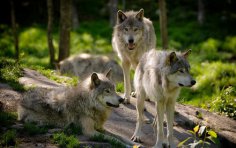
It's long been proven that social insects (ants, bees, wasps, etc.) have their own language for transmitting information. Bees developed this language in the form of dances, while ants and wasps use chemical markers. Dolphins and monkeys also have their own languages. As we can see, nature has provided a means of communication not only for humans.
But until recently, scientists had difficulty determining whether wolves had a language of their own. The difficulty was that virtually all predatory animals are silent. Only in a few rare cases do they vocalize.
Wolves strictly adhere to the principle of subordination. This is clearly visible even in zoos, when a male wolf, with a short, quiet growl, commands his female wolf not to disturb her sleep. Wolf pups easily absorb the nuances in their parents' voices and dare not disobey. But this could simply be due to centuries-old instincts, honed to the last detail. After all, a dog also uses the woof-woof method of “training” her puppies. But does this mean she's “telling” them anything? Of course not. A mother dog simply growls or barks to alert her puppies to her displeasure. And the puppies themselves are expected to understand the reason for her displeasure. There's no “meaningful” meaning to a dog's bark. A paradox? It's certainly strange that dogs, having wolves as their ancestors, have lost the ability to engage in intraspecies “meaningful” vocal communication.
A dog, like a wolf, can also howl at times. But a dog's howl is just a howl. Nothing more. A wolf is a different matter. Its howl can “tell” a lot about itself. Experienced wolf hunters can tell by its howl whether it's alone or with a female, tired or full of energy, full or hungry, returning from a hunt or just leaving… And all this “information” is intended not for the ears of the hunters, but for their fellow wolf-hunters. Even if a wolf howls at the moon, it's not out of boredom or self-pity (sounds strange, doesn't it?), but because it feels anxious.
A bright moon hinders a successful hunt. The wolf understands this. But the hunt must be carried out, otherwise, you'll die. Risks are taken. To confuse potential hunters, the wolf howls to call its fellow hunters to the hunt—the more tracks they leave in the snow, the easier it is to escape pursuit. This is one explanation for why wolves howl at the moon.
There's another explanation, but it's less convincing. It's about a solar eclipse. Wolves are said to howl at the moon out of fear, mistaking the bright night star for the sun, which is about to emerge from the Earth's shadow, and then everything will become clear. However, no matter how intelligent a wolf is, it's incapable of logically analyzing and comparing events. Otherwise, it wouldn't be darting in front of the red flags on the stretched rope, afraid to jump over them.
Wolf hunters are well versed in the language of gray predators. It's been proven that a mature wolf and a young wolf howl differently. It's well known that a mature wolf, upon hearing the howl of a young wolf, stops howling and quickly approaches it to drive it away from its territory. The competitive instinct kicks in. Hunters take advantage of this, and in this manner (imitating the young wolf's howl), lure the mature wolf into a shot. But not every mature wolf is caught in this way. So what's the matter?
The fact is that a young wolf's howl must also contain some “semantic” information—it's in the howl's duration, pitch, and volume. Wolves howl differently in different regions. It's similar to the Kursk and, say, Ryazan nightingales—their “knees” click differently. Similarly, wolves have specific “territorial” nuances in their howls. There have been attempts to “introduce” strange wolves into the pack to refresh their bloodline. All of these ended tragically—the pack rejected the strangers, who “speak” their own “dialect.”
Hunters are convinced that wolves have their own language for communication. Scientists are also gradually leaning toward this view. However, the difficulty so far is that a wolf will never howl in a zoo. And in the wild, recording the full range of nuances of a wolf's howl with a microphone and deciphering its meaning is much more difficult than doing the same in a dolphin tank.





